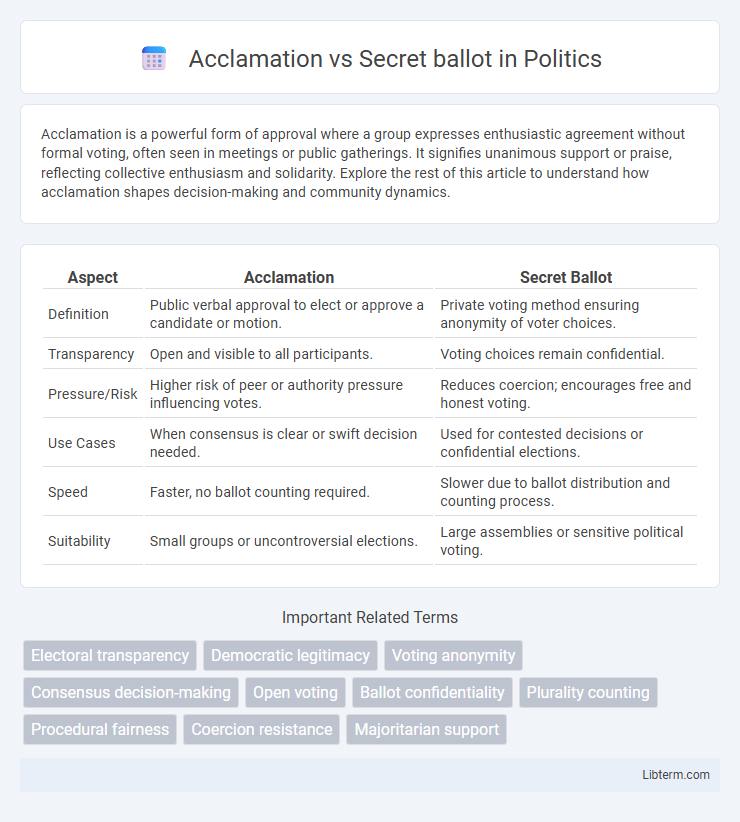Acclamation is a powerful form of approval where a group expresses enthusiastic agreement without formal voting, often seen in meetings or public gatherings. It signifies unanimous support or praise, reflecting collective enthusiasm and solidarity. Explore the rest of this article to understand how acclamation shapes decision-making and community dynamics.
Table of Comparison
| Aspect | Acclamation | Secret Ballot |
|---|---|---|
| Definition | Public verbal approval to elect or approve a candidate or motion. | Private voting method ensuring anonymity of voter choices. |
| Transparency | Open and visible to all participants. | Voting choices remain confidential. |
| Pressure/Risk | Higher risk of peer or authority pressure influencing votes. | Reduces coercion; encourages free and honest voting. |
| Use Cases | When consensus is clear or swift decision needed. | Used for contested decisions or confidential elections. |
| Speed | Faster, no ballot counting required. | Slower due to ballot distribution and counting process. |
| Suitability | Small groups or uncontroversial elections. | Large assemblies or sensitive political voting. |
Introduction to Acclamation and Secret Ballot
Acclamation is a voting method where participants express their approval vocally or by a show of hands, typically used for uncontroversial decisions requiring immediate consensus. The secret ballot ensures voter privacy by allowing individuals to cast votes confidentially, reducing coercion and promoting fair elections. Both methods serve distinct roles: acclamation suits quick agreement scenarios, while secret ballots underpin democratic and transparent decision-making processes.
Definition of Acclamation
Acclamation is a voting method where decisions are made verbally or by show of hands, expressing unanimous or general agreement without a formal ballot, often used in smaller, informal assemblies. It contrasts with the secret ballot, which ensures voter anonymity by allowing individuals to cast votes privately, thus preventing potential coercion or influence. Acclamation emphasizes transparency and immediate consensus but may risk peer pressure, unlike the confidentiality granted by secret ballots.
Definition of Secret Ballot
Secret ballot is a voting method ensuring voter anonymity, where choices are confidential to protect privacy and prevent coercion. It contrasts with acclamation, which involves open, vocal approval without secrecy. This system is fundamental in democratic processes to maintain fairness and reduce undue influence.
Key Differences Between Acclamation and Secret Ballot
Acclamation involves vocal or visible approval where votes are expressed openly, often by a show of hands or voice, ensuring transparency but risking peer pressure influence. Secret ballot maintains voter anonymity by allowing participants to cast votes privately, protecting individual choice and reducing coercion. The key difference lies in the voting method's visibility, with acclamation being public and immediate, while secret ballot ensures confidentiality and often requires more formal procedures.
Historical Context and Origins
Acclamation voting emerged in ancient democratic assemblies such as those of Athens, where oral affirmations served as an immediate and public means of expressing consent or dissent. The secret ballot originated in 19th-century reforms aimed at reducing coercion and bribery, exemplified by the Australian Ballot introduced in the 1850s to protect voter privacy and promote fair elections. Historically, acclamation reflects early communal decision-making practices, while the secret ballot represents the evolution toward individual voter confidentiality and electoral integrity.
Advantages of Acclamation
Acclamation offers advantages such as swift decision-making and cost-effectiveness by eliminating the need for ballots and vote counting. This method fosters unity and transparency during meetings by allowing participants to openly express consensus without confidential barriers. Acclamation is particularly beneficial in small groups or situations where unanimous agreement is evident, streamlining governance processes efficiently.
Advantages of Secret Ballot
Secret ballots ensure voter privacy, reducing the risk of coercion and voter manipulation, thus promoting genuine and free expression of choice. This method increases electoral integrity by preventing undue influence from powerful individuals or groups, enhancing democratic fairness. Furthermore, secret balloting encourages higher voter turnout as individuals feel safer casting their votes confidentially.
Potential Drawbacks of Each Method
Acclamation voting can lead to a lack of privacy and potential peer pressure, which may influence voters to conform rather than express their true preferences, undermining the integrity of the election process. Secret ballots protect voter anonymity, but they can be time-consuming, costly to administer, and susceptible to errors or fraud if not properly managed, potentially compromising the election's accuracy. Both methods require careful consideration of transparency, voter confidence, and administrative efficiency to ensure fair and credible outcomes.
Common Use Cases in Modern Elections
Acclamation is commonly used in small organizations or informal settings where unanimous consent or clear support is expected, allowing for rapid decision-making without a formal vote. Secret ballots are prevalent in larger elections, such as governmental or corporate elections, ensuring voter privacy and reducing bias or intimidation. Modern electoral systems often combine both methods depending on the election scale and need for confidentiality.
Choosing the Right Voting Method
Acclamation is a voting method where decisions are made by voice or show of hands, ideal for quick consensus in small, informal groups, while a secret ballot ensures voter privacy and reduces undue influence, making it essential for sensitive or larger-scale elections. Selecting the right voting method depends on factors like group size, decision sensitivity, and the need for confidentiality; secret ballots offer anonymity and fairness, whereas acclamation speeds up proceedings when unanimity or minimal dissent is expected. Considering the context and desired transparency level guides organizations in choosing between acclamation and secret ballot to balance efficiency and voter confidentiality.
Acclamation Infographic

 libterm.com
libterm.com